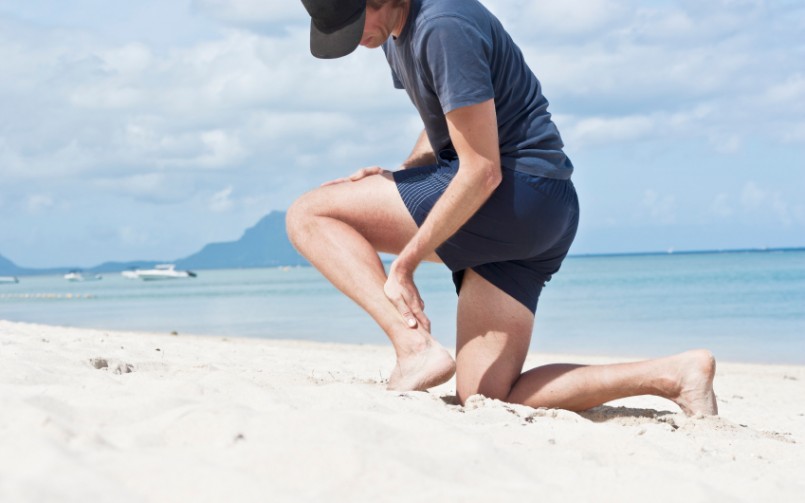
Should I Undergo An Achilles Tendon Repair?
 In classical mythology, Achilles was a nearly invincible hero. Unlike the rest of us, he had only one weak spot—his heel. While the story of Achilles may be a myth, the idea of the “Achilles heel” is not. Your Achilles tendon connects the muscles of your calf—the gastrocnemius and the soleus—to your heel bone, the calcaneus. This tendon is vital to walking and running, and it’s vulnerable to numerous types of injuries. Some of these are minor problems. If, however, the injury is severe, one treatment option that might be recommended is an Achilles tendon repair.
In classical mythology, Achilles was a nearly invincible hero. Unlike the rest of us, he had only one weak spot—his heel. While the story of Achilles may be a myth, the idea of the “Achilles heel” is not. Your Achilles tendon connects the muscles of your calf—the gastrocnemius and the soleus—to your heel bone, the calcaneus. This tendon is vital to walking and running, and it’s vulnerable to numerous types of injuries. Some of these are minor problems. If, however, the injury is severe, one treatment option that might be recommended is an Achilles tendon repair.
In this blog, NYC orthopedic foot and ankle specialist, Dr. Stuart Katchis, will address the common injuries involving the Achilles tendon and explain when an Achilles tendon repair may be necessary.
What are the most common injuries to the Achilles tendon?
Since it’s involved in walking—along with running and jumping—the Achilles tendon gets a great deal of use. The more active you are, the more stress and strain it experiences and the more likely it is to be injured. Some of the most common injuries to the Achilles tendon are tendonitis, tendinosis, and tendon rupture.
Achilles tendonitis, like other forms of tendonitis, is inflammation of the tendon. It is typically an overuse injury, and is often associated with sports-related activities. Activities that involve excessive running or jumping, particularly with sudden starts and stops, can lead to Achilles tendonitis. This type of injury is most often treated with conservative measures and is not a likely candidate for Achilles tendon repair.
If left untreated, Achilles tendonitis can sometimes progress to Achilles tendinosis. In this case, the tendon begins to deteriorate. Achilles tendinosis can also be the result of chronic tightness in the calf or bone spurs in the heel.
In an Achilles tendon rupture, the tendon tears or “snaps.” This often happens during sports. Achilles tendon tears usually occur in mid-tendon, between the heel and the bottom of the calf, but the tendon can also tear away from its attachment at the heel. When this happens, it may even pull out a piece of the heel bone that anchors it.
What injuries does an Achilles tendon repair treat?
Although severe cases of Achilles tendinosis may warrant surgery, Achilles tendon repair is most often employed in cases of an Achilles tendon rupture. With a rupture, the tendon is often torn to a point where the tendon becomes unable to do its job, and a repair is necessary in order to restore function.
Symptoms of an Achilles tendon rupture include:
- A sudden, intense pain in the back of your calf or your ankle during a strenuous activity
- A “pop” or “snap” when the pain occurs
- Pain and swelling at the back of your heel or a few inches above it
- The inability to bend your foot down, which can make it difficult to walk
- The inability to stand on your toes on the injured side
What happens during an Achilles tendon repair procedure?
An Achilles tendon repair is intended to restore function to the calf muscles of the affected leg. During this procedure, the surgeon exposes the ends of the torn tendon, pulls them back together, and sutures them in place so they can heal back together. In some cases where the torn tissue is more severely damaged, Achilles reconstruction may require the tendon to be reinforced with other tendons. After the surgery, the injured leg is immobilized to allow for proper healing. Physical therapy is an important aspect of the recovery process in the months that follow.
Looking to learn more about Achilles tendon repair in NYC?
Contact Dr. Stuart Katchis at Extend Orthopedics today by calling 212-434-4920 or schedule your appointment online if you’re experiencing any symptoms of an Achilles tendon injury. Dr. Katchis will be happy to discuss your treatment options and address whether you’re a good candidate for an Achilles tendon repair.



You must be logged in to post a comment.